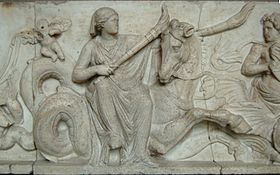
Summary
Doris (/ˈdoʊrɪs/; Ancient Greek: Δωρίς/Δωρίδος means 'bounty'[1]), in Greek mythology, was a sea goddess. She was one of the 3,000 Oceanids, daughters of the Titans Oceanus[2] and Tethys.[3]


Etymology edit
The name Doris is derived from the noun for a gift, δῶρον, from proto-Indo-European *déh₃rom of the same meaning.[citation needed]
Function edit
When not associated with a god, Doris represented the fertility of the ocean, goddess of the rich fishing-grounds found at the mouths of rivers where fresh water mingled with the brine.[citation needed]
Family edit
Being an Oceanid meant she was a sister of the river gods. By her husband Nereus, Doris was the mother of Nerites[2] and mother to the fifty Nereids,[4] including Thetis, Amphitrite and Galatea.[5]
Namesake edit
Doris Cove in Antarctica is named after the goddess.[6]
See also edit
Notes edit
- ^ Kerényi, Carl (1951). The Gods of the Greeks. London: Thames and Hudson. p. 41.
- ^ a b Aelian, De Natura Animalium 14.28
- ^ Hesiod, Theogony 350; Apollodorus, 1.8
- ^ Hesiod, Theogony 240; Apollodorus, 1.2.7; Hyginus, Fabulae Preface
- ^ Ovid, Metamorphoses 13.742 ff.
- ^ Doris Cove. SCAR Composite Gazetteer of Antarctica
References edit
- Apollodorus, The Library with an English Translation by Sir James George Frazer, F.B.A., F.R.S. in 2 Volumes, Cambridge, MA, Harvard University Press; London, William Heinemann Ltd. 1921. ISBN 0-674-99135-4. Online version at the Perseus Digital Library. Greek text available from the same website.
- Claudius Aelianus, On the Characteristics of Animals, translated by Alwyn Faber Scholfield (1884-1969), from Aelian, Characteristics of Animals, published in three volumes by Harvard/Heinemann, Loeb Classical Library, 1958. Online version at the Topos Text Project.
- Claudius Aelianus, De Natura Animalium, Latin translation by Friedrich Jacobs in the Frommann edition, Jena, 1832. Latin translation available at Bill Thayer's Web Site
- Claudius Aelianus, De Natura Animalium, Rudolf Hercher. Lipsiae, in aedibus B. G. Teubneri, 1864. Greek text available at the Perseus Digital Library.
- Gaius Julius Hyginus, Fabulae from The Myths of Hyginus translated and edited by Mary Grant. University of Kansas Publications in Humanistic Studies. Online version at the Topos Text Project.
- Hesiod, Theogony from The Homeric Hymns and Homerica with an English Translation by Hugh G. Evelyn-White, Cambridge, MA.,Harvard University Press; London, William Heinemann Ltd. 1914. Online version at the Perseus Digital Library. Greek text available from the same website.
- Kerényi, Carl, The Gods of the Greeks, Thames and Hudson, London, 1951.
- Publius Ovidius Naso, Metamorphoses translated by Brookes More (1859-1942). Boston, Cornhill Publishing Co. 1922. Online version at the Perseus Digital Library.
- Publius Ovidius Naso, Metamorphoses. Hugo Magnus. Gotha (Germany). Friedr. Andr. Perthes. 1892. Latin text available at the Perseus Digital Library.
External links edit
- Media related to Doris (mythology) at Wikimedia Commons


